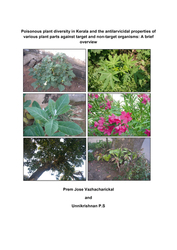| Fachbereiche | |
|---|---|
| Buchreihen (97) |
1382
|
| Nachhaltigkeit |
3
|
| Gesundheitswesen |
1
|
| Geisteswissenschaften |
2372
|
| Naturwissenschaften |
5408
|
| Mathematik | 228 |
| Informatik | 320 |
| Physik | 980 |
| Chemie | 1364 |
| Geowissenschaften | 131 |
| Humanmedizin | 243 |
| Zahn-, Mund- und Kieferheilkunde | 10 |
| Veterinärmedizin | 108 |
| Pharmazie | 147 |
| Biologie | 835 |
| Biochemie, Molekularbiologie, Gentechnologie | 121 |
| Biophysik | 25 |
| Ernährungs- und Haushaltswissenschaften | 45 |
| Land- und Agrarwissenschaften | 1005 |
| Forstwissenschaften | 201 |
| Gartenbauwissenschaft | 20 |
| Umweltforschung, Ökologie und Landespflege | 148 |
| Ingenieurwissenschaften |
1798
|
| Allgemein |
98
|
|
Leitlinien Unfallchirurgie
5. Auflage bestellen |
|
Erweiterte Suche
Poisonous plant diversity in Kerala and the antilarvicidal properties of various plant parts against target and non-target organisms
A brief overview
Unnikrishnan P.S (Autor)Prem Jose Vazhacharickal (Autor)
Vorschau
Leseprobe, Datei (650 KB)
Inhaltsverzeichnis, Datei (570 KB)
Poisonous plants are those plants having chemical constituents that are harmful for animals as well as humans. Since plants cannot move they adapt this system as an escape from its predators. The toxic chemical substances include tannins, alkaloids, phenolic, polyacetylenes, terpenes, essential oils. Poison from plant can occur by injection, inhalation, or direct contact and can cause effect from mild irritation to death. The poisonous plants diversity is very high in Kerala in which most of the poisonous plant remains underutilized or neglected. Present investigation is to identify different verities of common poisonous plants seen in Kerala, and study its morphology, poisonous parts, toxic element, symptoms, medicinal uses and anti-larvicidal activity of selected plants. Seventeen poisonous plants where observed from which four plants where taken for further studies on anti-larvicidal activity which includes Datura stramonium, Ricinus communis, Calotropis gigantean, Nerium oleander. Leaf, stem, flower, fruit where separated according. The toxic effect of these plants parts where studied on targeted (larva) and non-targeted (Fish and snail) organism using three extracts; Methanol, Chloroform and Distilled water with two concentrations (2% & 5%). The results shows fruit extracts of Ricinus commuis shows lethal effect on mosquito larva (targeted) and less or no effect on snail and fish (non-targeted). The extracts of fruits of Ricinus commuis can be used as cheap anti-larvicidal agent which is easily available and has less effect on other non-targeted organism.
| ISBN-13 (E-Book) | 9783736982253 |
| Sprache | Englisch |
| Seitenanzahl | 66 |
| Auflage | 1. |
| Erscheinungsort | Göttingen |
| Erscheinungsdatum | 30.05.2016 |
| Allgemeine Einordnung | Dissertation |
| Fachbereiche |
Land- und Agrarwissenschaften
|
| Schlagwörter | Poisonous plants, Kerala |








